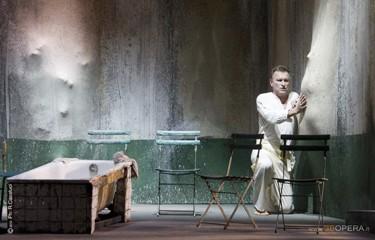Wolfgang Rihm - Jakob Lenz (2012)
Wolfgang Rihm - Jakob Lenz (2012)

1. Jakob Lenz Angius Bologna 12 04 2012 Jakob Lenz - Tomas Möwes Oberlin - Markus Hollop Kaufmann - Daniel Kirch 6 stimmen: Anna Maria Sarra (sop 1) Paola Francesca Natale (sop 2) Alena Sautier (mz 1) Romina Boscolo (mz 2) Gabriele Ribis (bs 1) Christian Faravelli (bs 2) 2 kinder Valentina Pucci (12) Benedetta Fanciulli (12) Anna Pitzalis (13, 15) Valeria Cammarata (13, 15) Orchestra del Teatro Comunale di Bologna Marco Angius – conductor Bologna 12.04.2012 Broadcast Radio DVBT Rai Radiotre
The source for the libretto, Büchner’s Lenz (1835), tells the true story of the Sturm und Drang poet’s retreat to the picturesque mountain town of Waldersbach to stay with the progressive pastor Johann Oberlin. Lenz’s ‘cold baths’ in the village fountain not only illustrate his incipient madness, but also show him trying to clean away the painful memory of his unrequited love for Friederike Brion – herself the jilted lover of another writer, Goethe. The dunking, taking place outside in a reedy marsh in this version, is also a visual translation of Büchner’s mystical descriptions of nature. It is not enough for Lenz to witness the beauty of the mountains, the earth, the rivers – he wants to merge seamlessly into them.
The themes of insanity, religion, anti-idealism were all distilled into Büchner’s next project, the play Woyzeck (1837), familiar to opera-goers as Alban Berg’s Wozzeck (1925). And as one might expect, Rihm, who was only 25 when he began work on Lenz, has taken plenty of lessons from his predecessor. Lenz shares Wozzeck’s tight structure – a series of short scenes, 13 rather than 15, each with its own distinct musical character related to the content of the stage action. The style can also loosely be characterized as ‘expressionist’. The audience sees – or rather hears – the world not as an external observer but from inside Lenz’s head. The one difference is that, whereas Berg let his sympathy for Wozzeck seep into the score, Rihm manages to keep his emotions under control, more in tune with the warts-and-all ‘truth’ aesthetic that Lenz expounds in his only lucid moments.
Rihm has made full use of the opportunities for creating surprising instrumental effects that a depiction of insanity affords. The inventiveness of the sound-palette is reason enough to go and see this piece, and all the more impressive given that all the sonic contortions are wrung out of just 11 players. The two stand-out scenes are Scene 5, where Lenz, a theology graduate, offers to preach the sermon for Oberlin and Scene 9, where he is tormented by hallucinatory voices, including that of his lover, floating over the mountain. In the former, the external congregational singing forms a backdrop against which we hear the turmoil going on inside Lenz’s head. By manipulating the uncanny web of sound that results, Rihm has captured the shift in Lenz’s mental state from (using Büchner’s words) ‘a sweet sensation of endless well-being’ to one in which ‘the whole universe seemed stricken by terrible wounds’ filling him ‘with indescribable pain’.
Along with the climax of the piece in Scene 11 – where, after failing to bring a dead girl back to life, Lenz finally loses his faith in God and tries to kill himself – these passages demonstrate the success of the dramatic conception. Even though librettist Michael Fröhling has done a good job of converting Büchner’s descriptive prose into dialogue and choreographer Anjali Mehra made sure there was plenty going on on stage, there is very little actual tension between the characters. Oberlin is powerless to help Lenz, despite his best efforts, and is mostly relegated to a voice on the periphery of his consciousness. The memory of Friederike haunts him, but there can be no interaction with a ghost. The only friction occurs with the disturbing arrival of his stablemate Christoph Kaufmann, here got up as an effeminate dandy, who delivers an unwelcome letter from his father begging him to return.
Jakob LenzInstead, the drama that Rihm’s music articulates is Lenz’s valiant but doomed struggle against his own schizophrenia – the novella being regarded by some German psychiatrists as one of the first case studies of the illness. The tragedy of his eventual defeat is that it reduces the previously sensitive poet who valued the ‘life even of the meanest of men’ into an empty shell with ‘no fear, no longing’, seeing ‘his existence [only] as a necessary burden’.
The music, although no easy ride, is immediate enough to be enjoyable on a first listen. And with a uniformly good cast supporting Shore’s towering central performance, this production has everything to recommend it. ---Marc Brooks, musicalcriticism.com
download: uploaded yandex 4shared mediafire solidfiles mega filecloudio nornar ziddu
Last Updated (Tuesday, 08 April 2014 21:44)








